1989: Day by Day
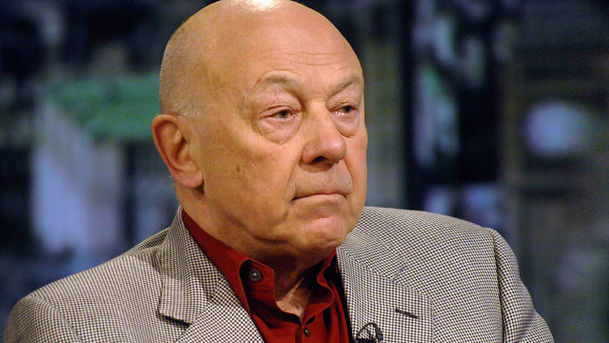
Sir John Tusa looks back at the events making the news 20 years ago
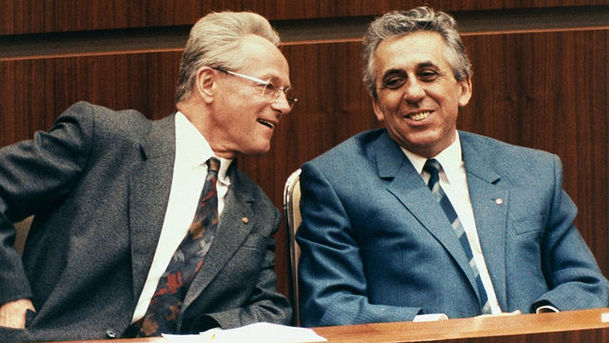
1989: Day by Day - 10th December 1989
Sir John Tusa looks back at the events making the news 20 years ago. The president of Czechoslovakia swears in the country's first non-communist majority government in 41 years.
Details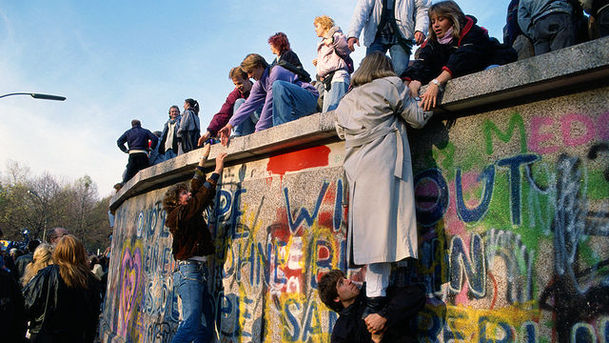
1989: Day by Day - 10th November 1989
Hundreds of thousands of East Germans arrive in West Berlin amid scenes of shock and joy. East Germany will hold free, democratic and universal elections.
Details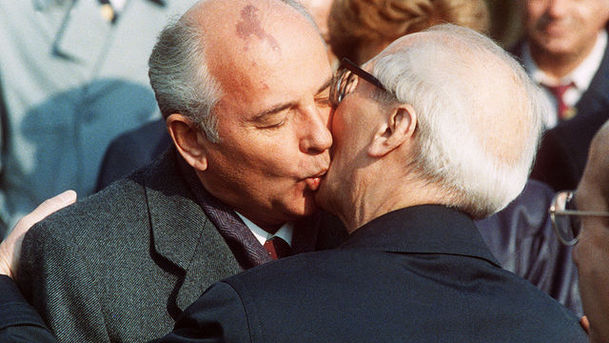
1989: Day by Day - 10th October 1989
In East Germany the morning after the demonstrations, the police violence people had feared had not occurred; at the Tory conference Kenneth Baker summons the spirit of Henry V.
Details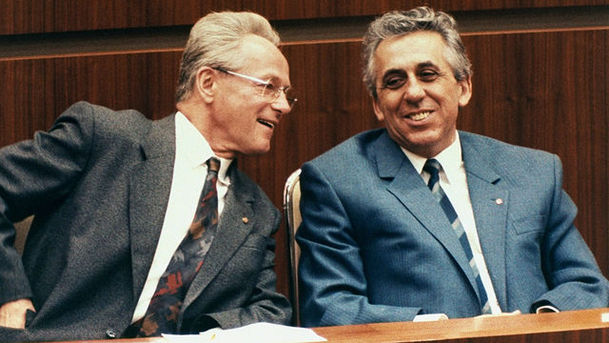
1989: Day by Day - 11th December 1989
Sir John Tusa looks back at the events making the news 20 years ago. The forced repatriation of the Vietnamese Boat People begins, despite protests and pleas from around the world.
Details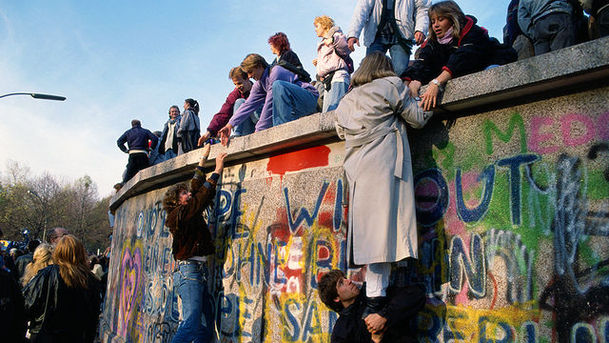
1989: Day by Day - 11th November 1989
Bulldozers tear down sections of the Berlin Wall to make more crossing points; 129 are injured in a riot between police and protestors in Moldavia - Moscow sends in the troops.
Details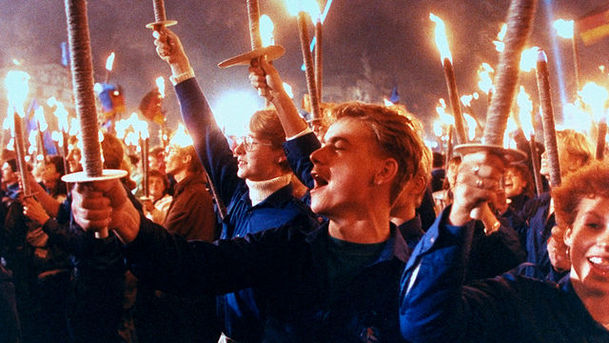
1989: Day by Day - 11th October 1989
Jive Bunny gets on the Juke Box Jury's nerves; the Tory party's environment minister get tough on litter louts but Greenpeace are disappointed; calls continue for Mandela's release.
Details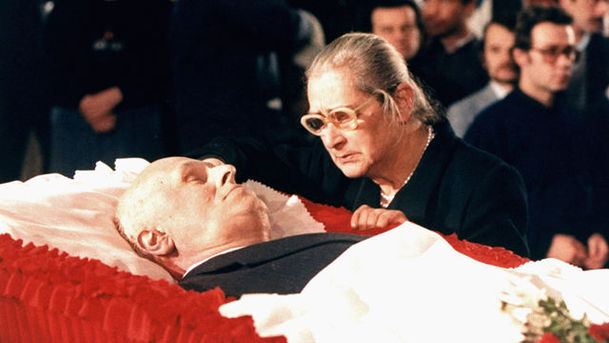
1989: Day by Day - 12th December 1989
Sir John Tusa looks back at the events making the news 20 years ago. US secretary of state James Baker meets East Germany's de facto leader Hans Modrow.
Details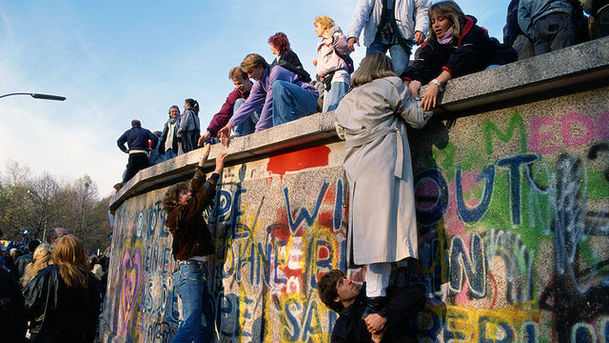
1989: Day by Day - 12th November 1989
The mayors of East and West Berlin shake hands at a new border crossing at Potsdamerplatz; El Salvador declares a curfew as fighting between troops and rebels leaves 78 people dead.
Details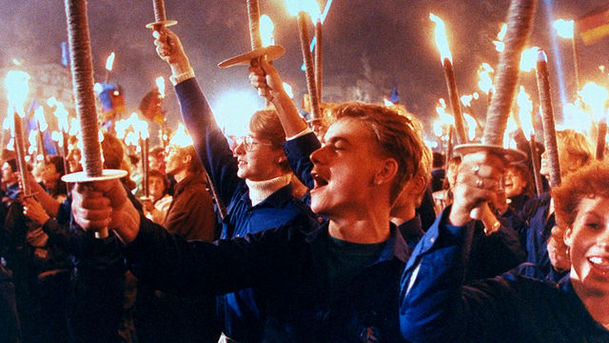
1989: Day by Day - 12th October 1989
Chancellor Nigel Lawson speaks at the Tory party conference to defend the 15 per cent interest rate; East German minister for ideology calls for reform of the political system.
Details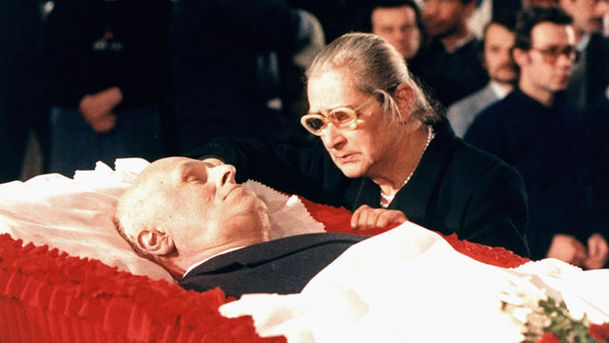
1989: Day by Day - 13th December 1989
Sir John Tusa looks back at the events making the news 20 years ago. President FW de Klerk meets with Nelson Mandela.
Details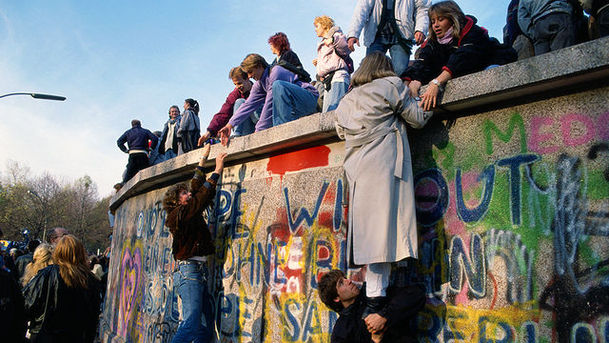
1989: Day by Day - 13th November 1989
The East German Politburo elects Hans Modrow as prime minister; President Mitterand calls an urgent EU summit to forge consent on the future of Europe.
Details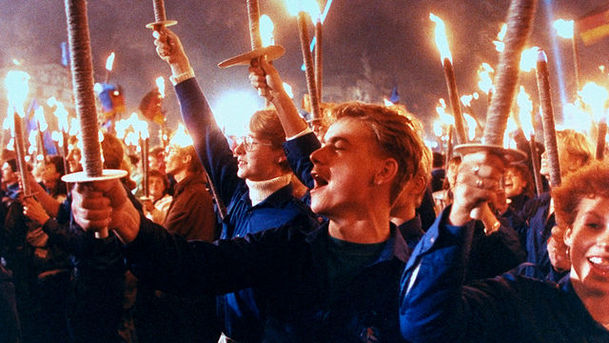
1989: Day by Day - 13th October 1989
Margaret Thatcher address the Tory conference on her 64th birthday to chants of '10 more years', and Douglas Hurd declares war on the 'scourge of acid house parties'.
Details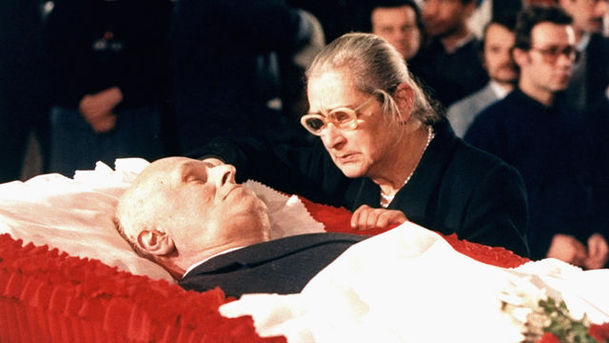
1989: Day by Day - 14th December 1989
Sir John Tusa looks back at the events making the news 20 years ago. Chile elects a civilian president to replace Augusto Pinochet.
Details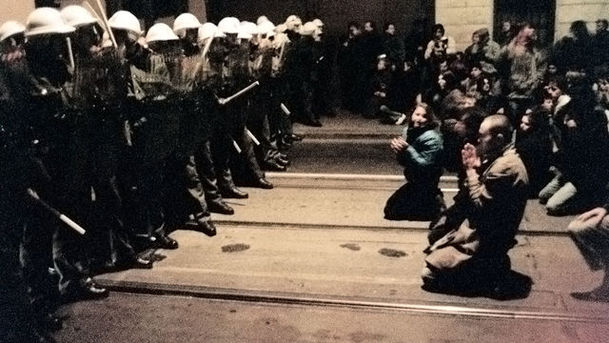
1989: Day by Day - 14th November 1989
Czechoslovakia eases restrictions on foreign travel; an inquiry begins into the Guilford Four case to establish whether police did in fact falsify evidence.
Details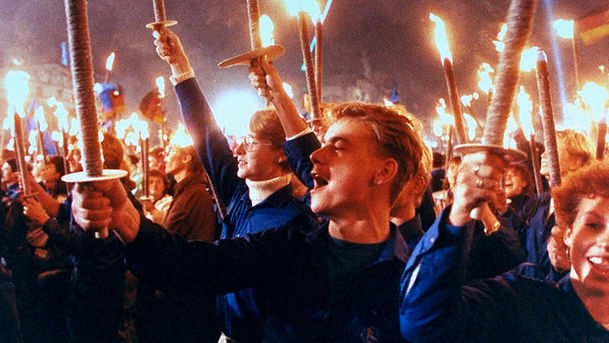
1989: Day by Day - 14th October 1989
Hungarian-born Estee Lauder opens the first cosmetics shop in the new-look socialist Belgrade, Poland faces 1000 per cent inflation and London Fashion Week anticipates the 90s look.
Details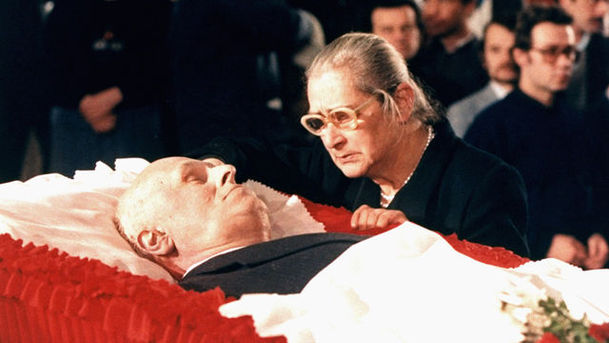
1989: Day by Day - 15th December 1989
Sir John Tusa looks back at the events making the news 20 years ago. Soviet human rights campaigner Andrei Sakharov dies.
Details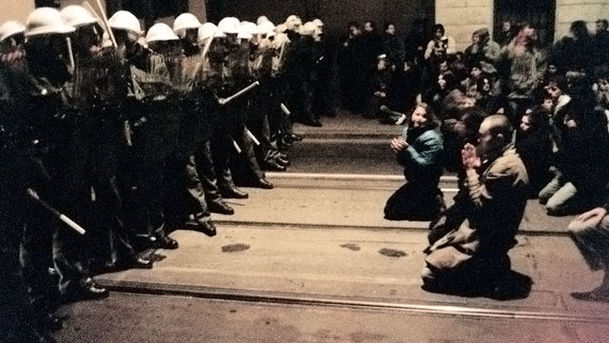
1989: Day by Day - 15th November 1989
Chancellor John Major gives his first Autumn Statement - City analysts predict gloom for the 90s; Lech Walesa, leader of Poland's Solidarity party, lobbies the US Senate for aid.
Details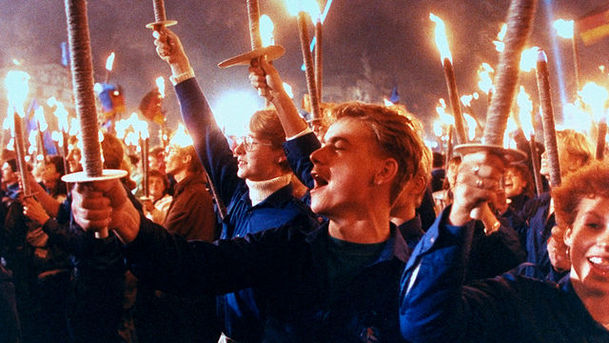
1989: Day by Day - 15th October 1989
ANC leader Walter Sisulu is released from prison sparking nationwide celebrations, the UN agrees a global ban on the ivory trade, and Jive Bunny reaches number one in the charts.
Details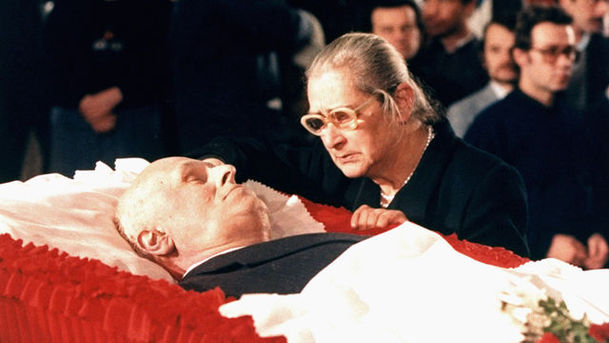
1989: Day by Day - 16th December 1989
Sir John Tusa looks back at the events making the news 20 years ago. East Germany discusses what do to after dismantling the Stasi.
Details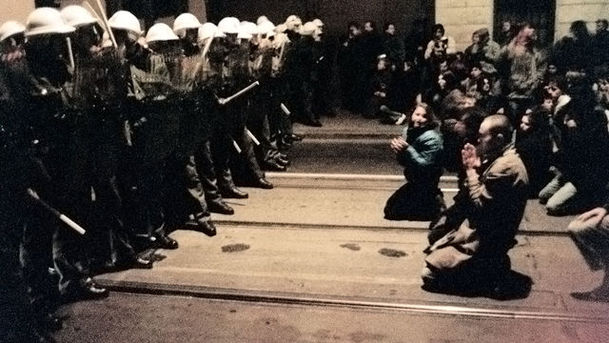
1989: Day by Day - 16th November 1989
Foreign secretary Douglas Hurd crosses the Berlin Wall and South Africa's president announces that its beaches are to be opened to all races.
Details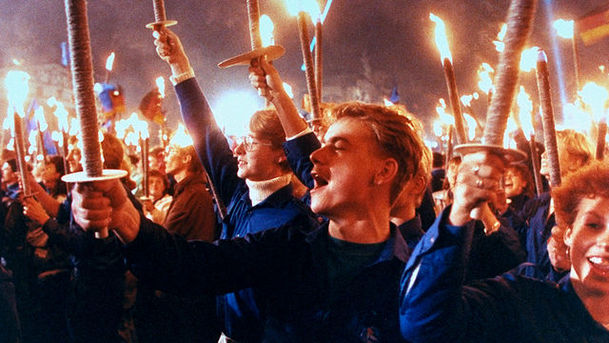
1989: Day by Day - 16th October 1989
The financial markets recover after Friday's Wall Street crash, averting another Black Monday; rehearsals begin for the first televised coverage of parliament.
Details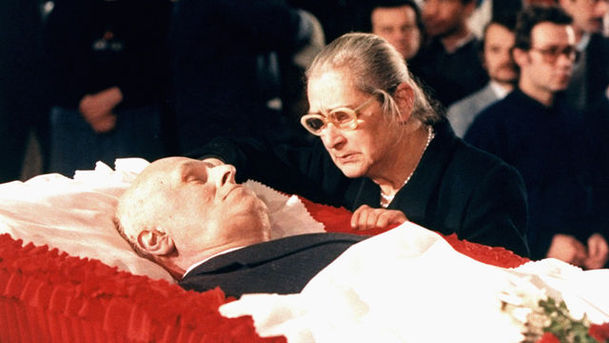
1989: Day by Day - 17th December 1989
Sir John Tusa looks back at the events making the news 20 years ago. Labour select Peter Mandelson to stand as an MP.
Details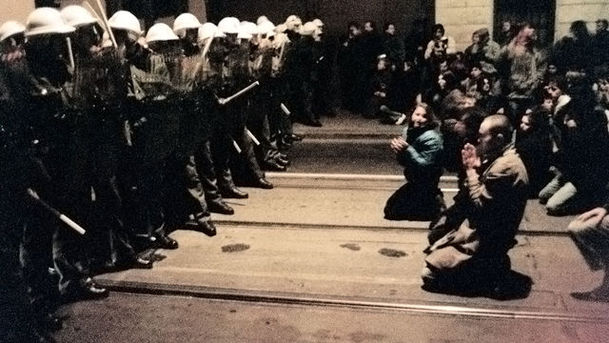
1989: Day by Day - 17th November 1989
A Labour peer declares the chances of catching AIDS through heterosexual relations are statistically invisible and in Prague the police beat protesters as they call for reforms.
Details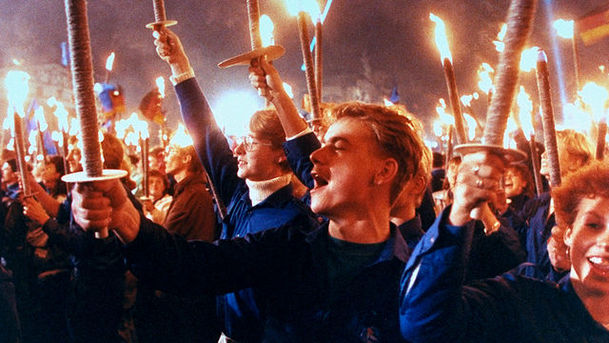
1989: Day by Day - 17th October 1989
The Guildford Four have their sentence overturned after 14 years in prison, and ambulance workers threaten hunger strike to demand higher pay.
Details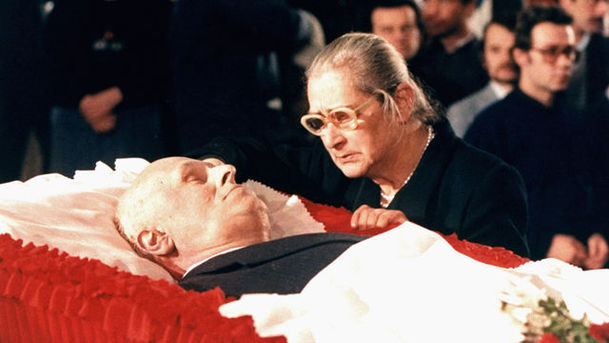
1989: Day by Day - 18th December 1989
Sir John Tusa looks back at the events making the news 20 years ago. Troops have fired on protestors in Romania.
Details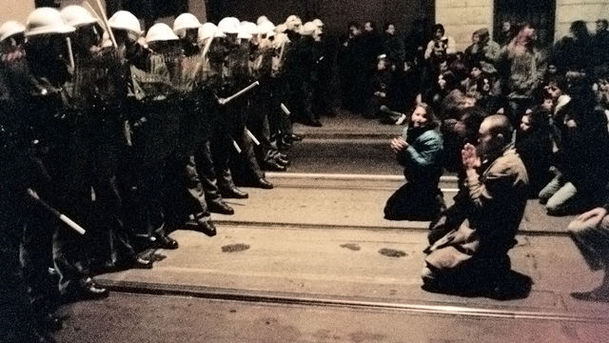
1989: Day by Day - 18th November 1989
Bulgaria witnesses its biggest demonstrations in 40 years, European leaders discuss the reshaping of Europe and, in Prague, rumours spread that the police have killed a student.
Details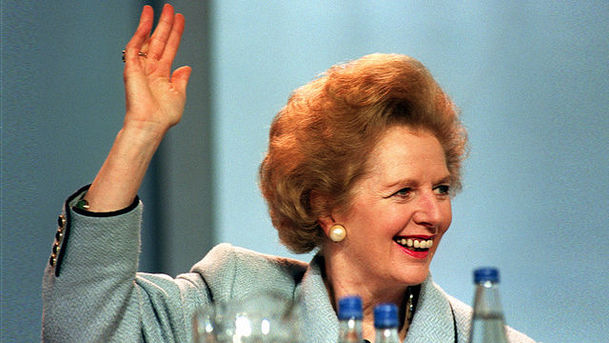
1989: Day by Day - 18th October 1989
Erich Honecker, the East German leader of 18 years and architect of the Berlin Wall, resigns; all Commonwealth countries agree on sanctions against South Africa - except for the UK.
Details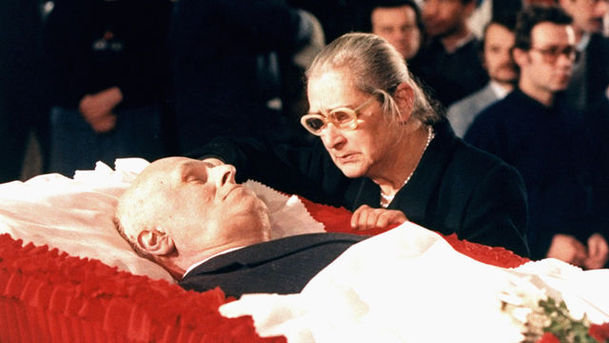
1989: Day by Day - 19th December 1989
Sir John Tusa looks back at the events making the news 20 years ago. Serious unrest is reported in Romania, with hundreds massacred.
Details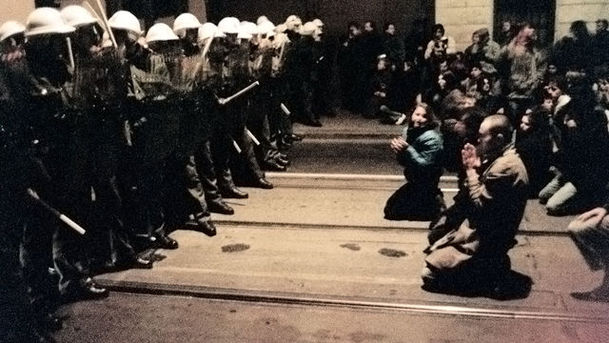
1989: Day by Day - 19th November 1989
London ambulance workers continue their strike, New Kids on the Block reach number one and the Czech demonstrations gather pace.
Details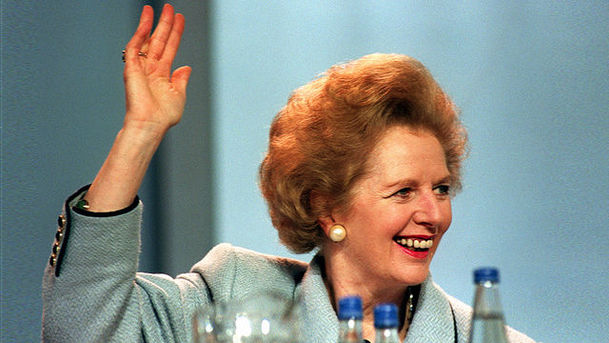
1989: Day by Day - 19th October 1989
The Guildford four are released; volunteers help to deal with the effects of the San Francisco earthquake; Walter Sisulu considers the end of the armed struggle in South Africa.
Details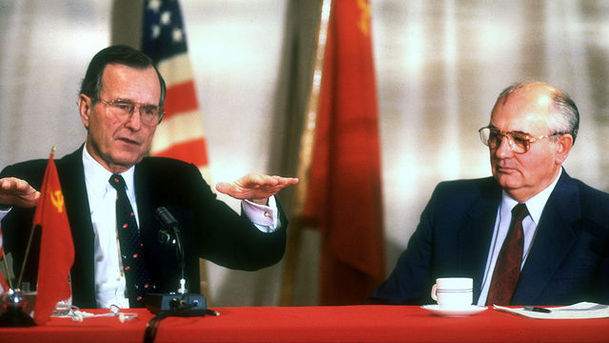
1989: Day by Day - 1st December 1989
Mikhail Gorbachev becomes the first Soviet leader to visit the Vatican and there is fierce fighting in the Philippines as thousands of troops attempt to overthrow their president.
Details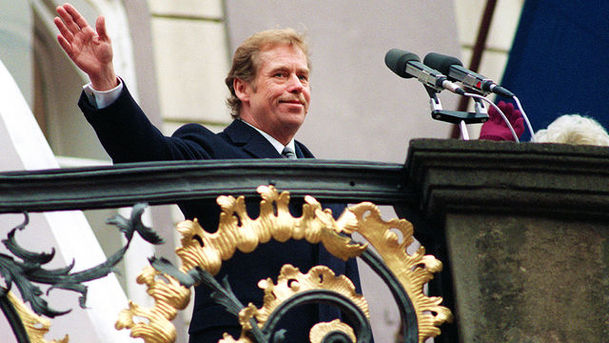
1989: Day by Day - 1st January 1990
Sir John Tusa looks back at the events making the news 20 years ago. Gorbachev and Bush welcome a new decade.
Details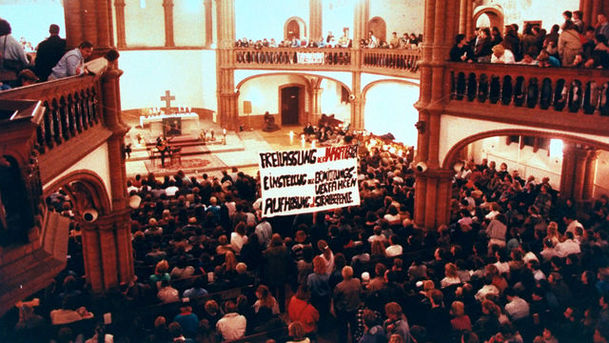
1989: Day by Day - 1st November 1989
President Bush agrees to meet Chairman Gorbachev in the Mediterranean for unofficial talks; President Ortega of Nicaragua breaks a 19-month ceasefire with US-backed Contra rebels.
Details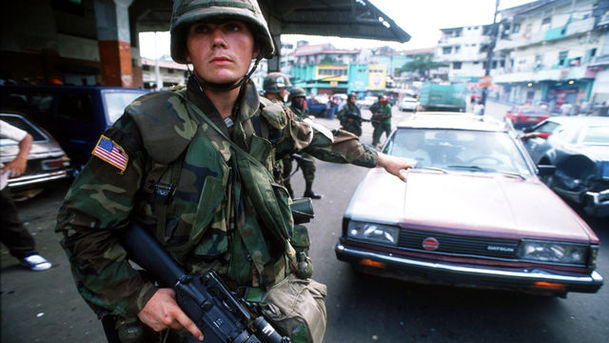
1989: Day by Day - 20th December 1989
Sir John Tusa looks back at the events making the news 20 years ago. US forces looking for General Noriega invade Panama.
Details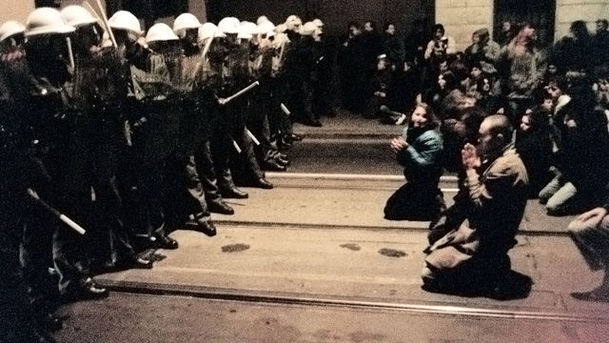
1989: Day by Day - 20th November 1989
In Romania, Nicolae Ceausescu receives 67 standing ovations during a six-hour speech as he refuses to take note of the changes sweeping Eastern Europe.
Details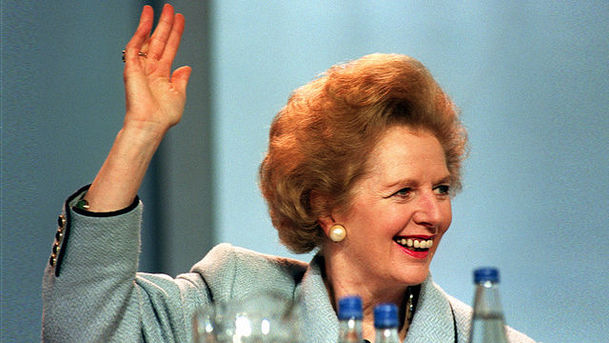
1989: Day by Day - 20th October 1989
Nuns lose their fight to save 5,000 chickens, and actors pay a final tribute to Sir Laurence Olivier at Westminster Abbey.
Details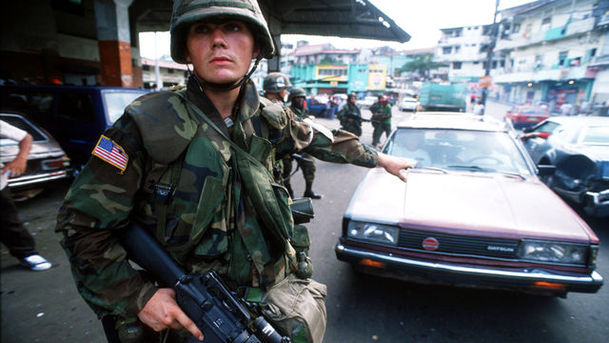
1989: Day by Day - 21st December 1989
Sir John Tusa looks back at the events making the news 20 years ago. Romanian President Nicolae Ceausescu is booed in public.
Details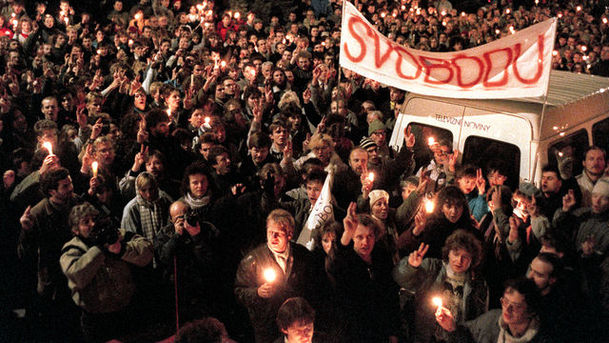
1989: Day by Day - 21st November 1989
In El Salvador, rebels continue to occupy the Sheraton Hotel; MPs relish their day in the limelight as TV cameras are permitted in the House of Commons.
Details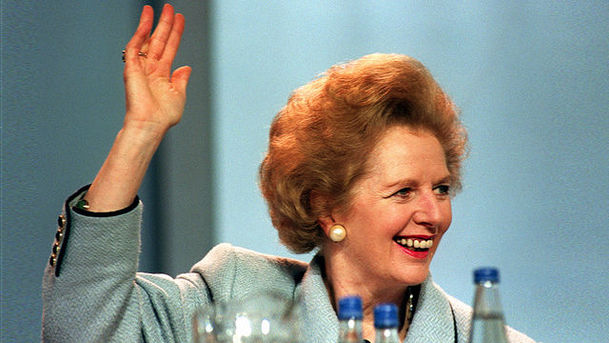
1989: Day by Day - 21st October 1989
Thousands of protestors march through East Germany; a BBC survey suggests one third of British muslims believe Salman Rushdie should be killed because of The Satanic Verses.
Details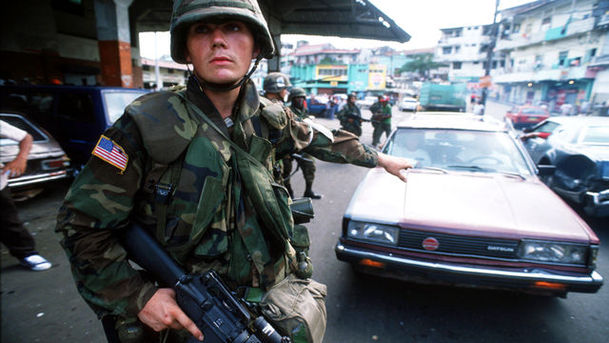
1989: Day by Day - 22nd December 1989
Sir John Tusa looks back at the events making the news 20 years ago. Romanian President Ceausescu is caught as he tries to escape.
Details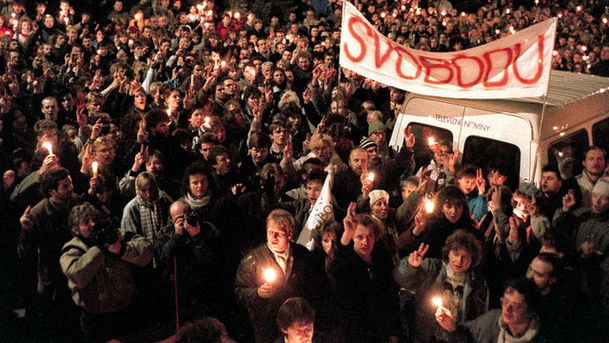
1989: Day by Day - 22nd November 1989
Lebanon's President Muawad is killed, 17 days after being elected; in Prague the snow falls and rumours sweep through the tens of thousands who continue their protest.
Details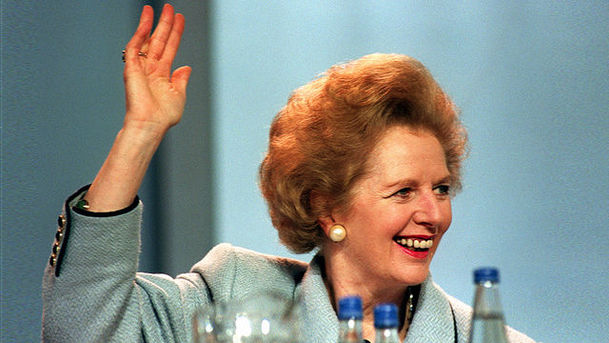
1989: Day by Day - 22nd October 1989
Margaret Thatcher causes consternation at the Commonwealth over sanctions against South Africa and the Irish prime minister calls for a review of the Birmingham Six case.
Details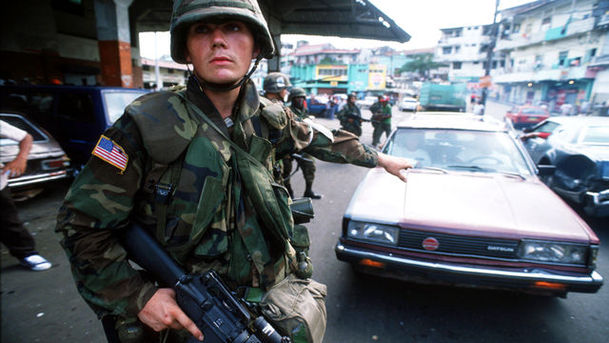
1989: Day by Day - 23rd December 1989
Sir John Tusa looks back at the events making the news 20 years ago. Intense fighting continues in Romania.
Details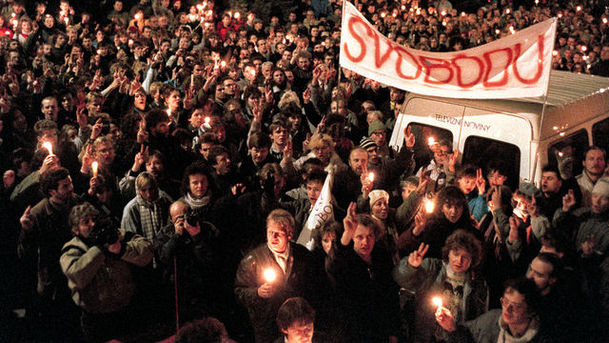
1989: Day by Day - 23rd November 1989
Demonstrations in Prague continue to gather pace and the Conservative Party faces a leadership challenge as Mrs Thatcher announces that she is happy to contest two more elections.
Details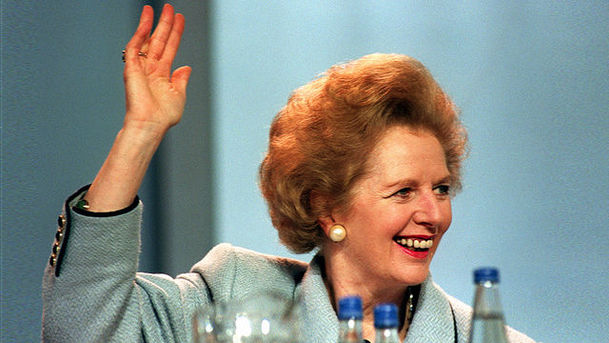
1989: Day by Day - 23rd October 1989
A quarter of a million East Germans march in Leipzig in the country's biggest-ever demonstration; in Hungary, tens of thousands of people remember the victims of the 1956 uprising.
Details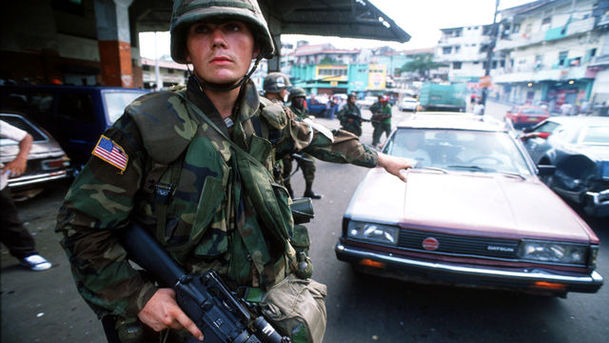
1989: Day by Day - 24th December 1989
Sir John Tusa looks back at the events making the news 20 years ago. General Noriega is surrounded as he seeks refuge in Panama.
Details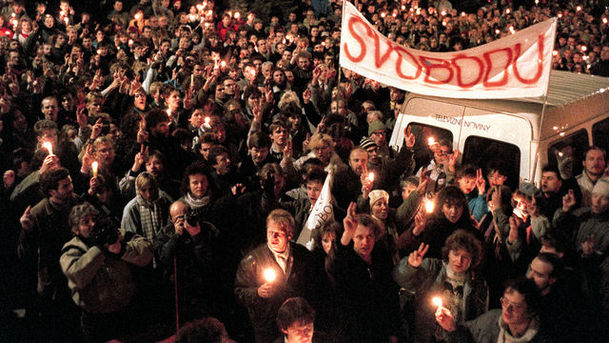
1989: Day by Day - 24th November 1989
The Czech leadership are forced to resign and Alexander Dubcek makes his first pubic appearance in Prague for 21 years.
Details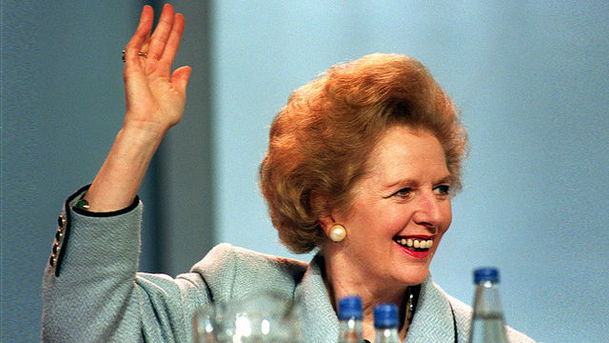
1989: Day by Day - 24th October 1989
Egon Krenz is officially installed as East Germany's new leader but protests continue; in America, Zsa Zsa Gabor and disgraced TV evangelist Jim Bakker both appear in court.
Details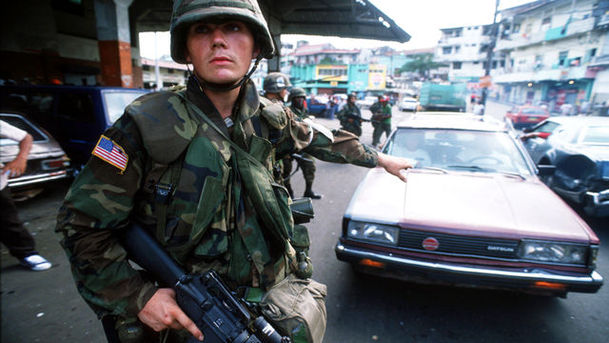
1989: Day by Day - 25th December 1989
Sir John Tusa looks back at the events making the news 20 years ago. Ceausescu and his wife are executed in Romania.
Details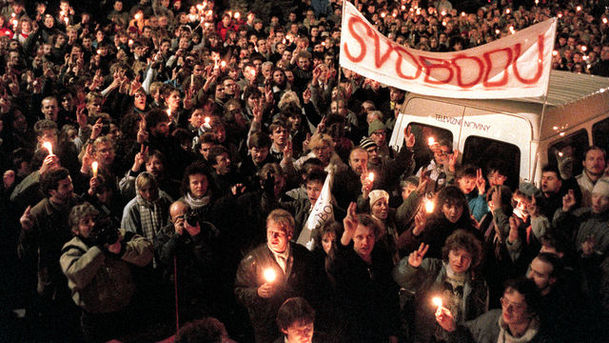
1989: Day by Day - 25th November 1989
Czech demonstrators keep up the pressure for free elections; schoolchildren in Buckinghamshire organise a protest against Nestle for its promotion of dried milk in the Third World.
Details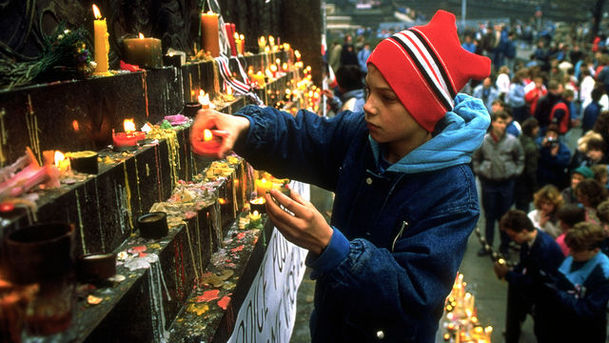
1989: Day by Day - 25th October 1989
The BBC's Panorama programme asks whether Britain is about to face a crack epidemic, and recently-freed South African activist Oscar Mpetha sends a wry thanks to Margaret Thatcher.
Details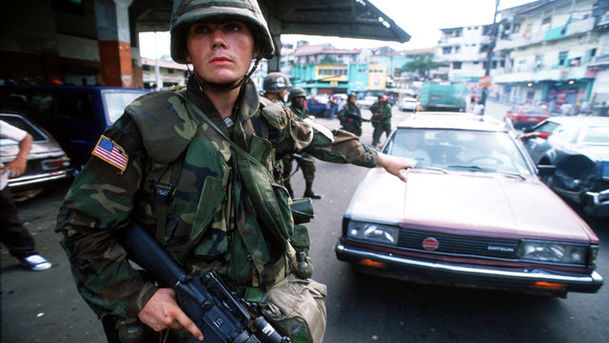
1989: Day by Day - 26th December 1989
Sir John Tusa looks back at the events making the news 20 years ago. Romania buries its dead.
Details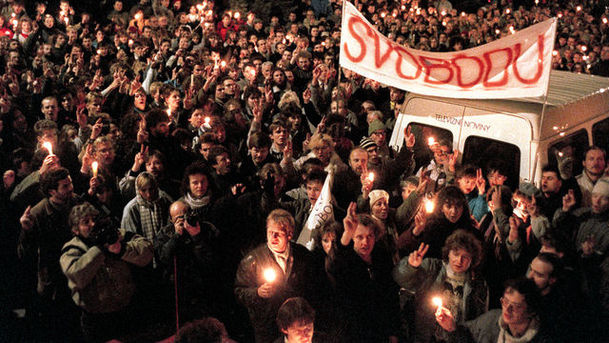
1989: Day by Day - 26th November 1989
Czechoslovakia's prime minister has his first meeting with the country's leading dissident, Vaclav Havel; Lady Mosley, Sir Oswald's wife, talks to Sue Lawley on Desert Island Discs.
Details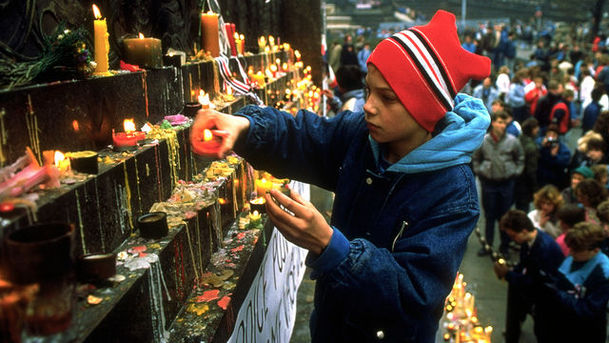
1989: Day by Day - 26th October 1989
Nigel Lawson resigns after six years as Chancellor of the Exchequer, prompting a further drop in the pound; President Gorbachev promises unilateral disarmament in the Baltic.
Details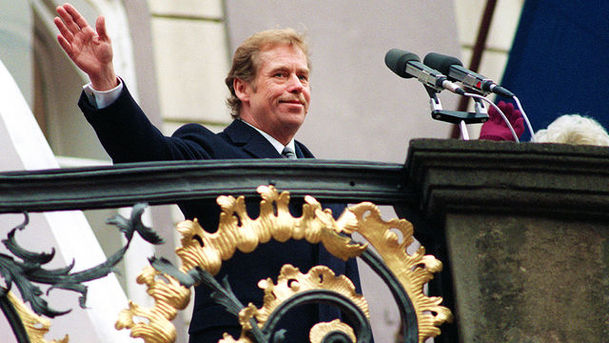
1989: Day by Day - 27th December 1989
Sir John Tusa looks back at the events making the news 20 years ago. The world comes to Romania's aid.
Details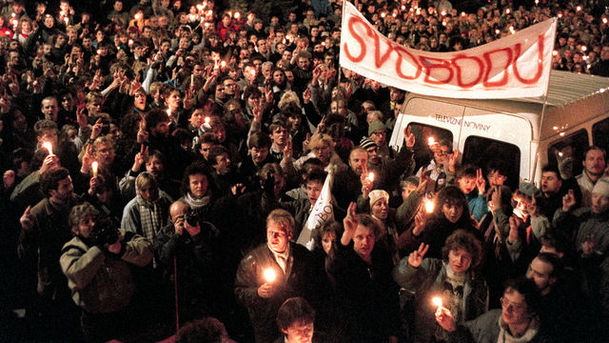
1989: Day by Day - 27th November 1989
Margaret Thatcher defends her record on the BBC's Panorama and Michael Buerk reports from Ethiopia, where millions are facing starvation.
Details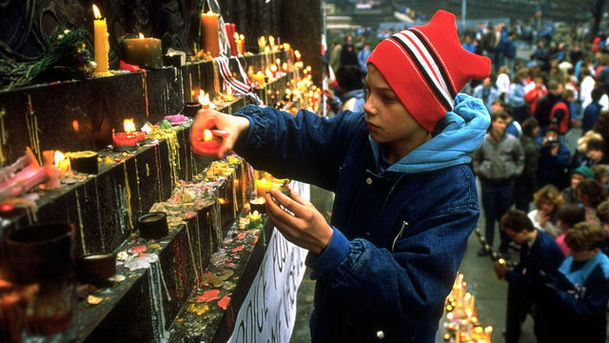
1989: Day by Day - 27th October 1989
Margaret Thatcher's leadership style comes under fire after a quick Cabinet reshuffle; the IRA admits killing a British soldier and his six-month-old baby in West Germany.
Details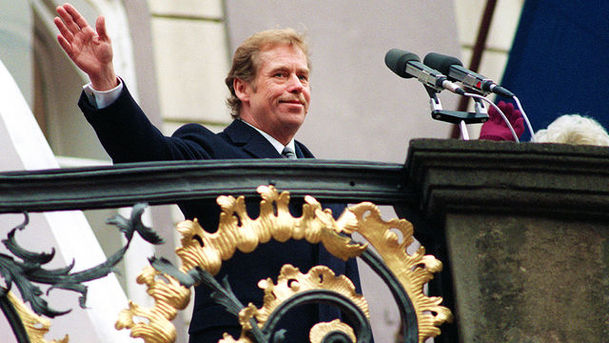
1989: Day by Day - 28th December 1989
Sir John Tusa looks back at the events making the news 20 years ago. Jimi Hendrix is deployed against General Noriega.
Details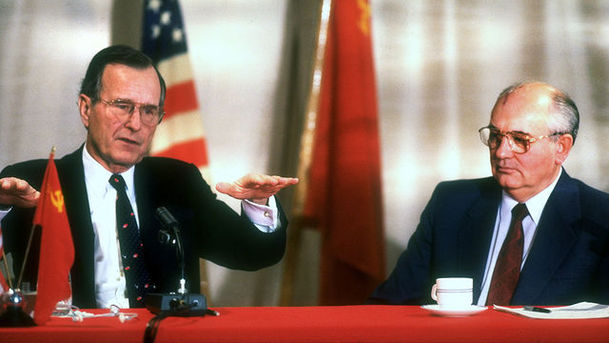
1989: Day by Day - 28th November 1989
The Czech PM Ladislav Adamec heralds a historic moment as he formally announces the end of the Communist Party's monopoly on power.
Details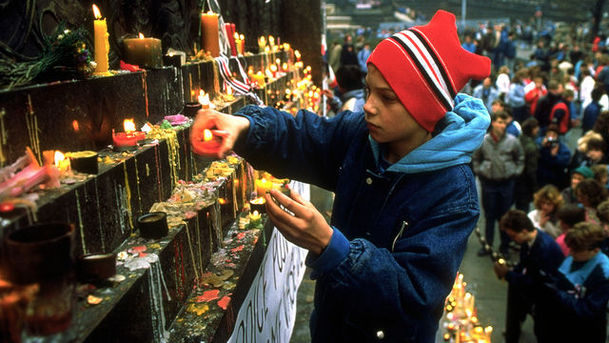
1989: Day by Day - 28th October 1989
A pro-democracy rally in Prague turns violent after police move in; a Northern Irish peace train is held overnight due to a bomb scare.
Details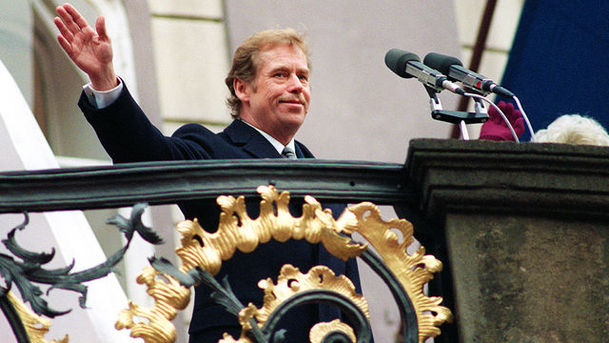
1989: Day by Day - 29th December 1989
Sir John Tusa looks back at the events making the news 20 years ago. Playwright Vaclav Havel is elected president of Czechoslovakia.
Details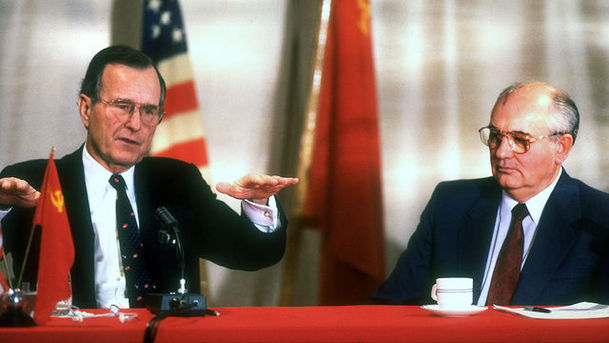
1989: Day by Day - 29th November 1989
Margaret Thatcher and her challenger Sir Anthony Meyer submit their nomination papers as the fight begins for the leadership of the Conservative Party.
Details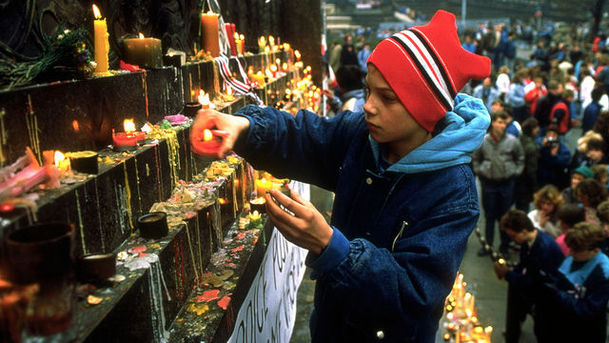
1989: Day by Day - 29th October 1989
Walter Sisulu addresses 70,000 people at the biggest ever ANC rally; East Berlin's Communist party chief tells socialists, 'we need to practise democracy'.
Details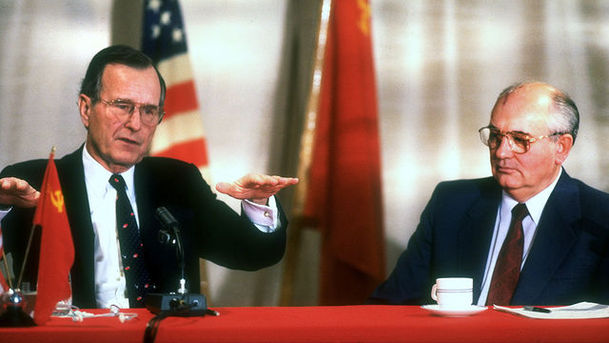
1989: Day by Day - 2nd December 1989
Bush and Gorbachev begin their summit in Malta as a poll shows that Margaret Thatcher is losing favour with the public ahead of a leadership challenge from Sir Anthony Meyer.
Details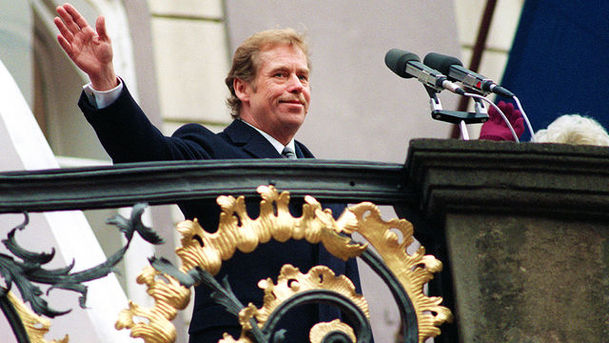
1989: Day by Day - 2nd January 1990
Sir John Tusa looks back at the events making the news 20 years ago. Reorganisation begins in Romania as fledgling political parties take shape.
Details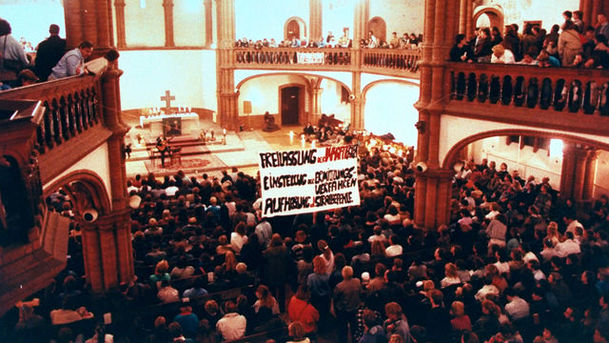
1989: Day by Day - 2nd November 1989
In an unprecedented move, KGB officers take questions from the public on live TV; price rises on British Rail fill commuters with woe.
Details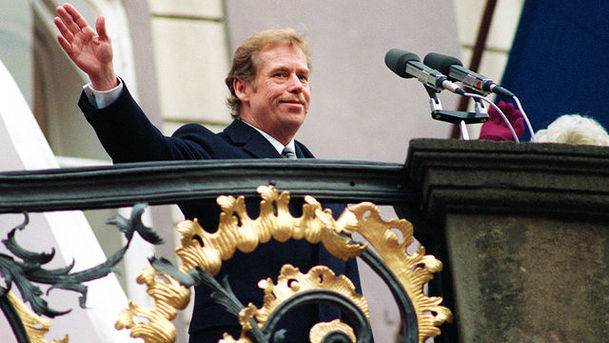
1989: Day by Day - 30th December 1989
Sir John Tusa looks back at the events making the news 20 years ago. The lavish home of Romanian dictator Ceausescu is revealed to the world.
Details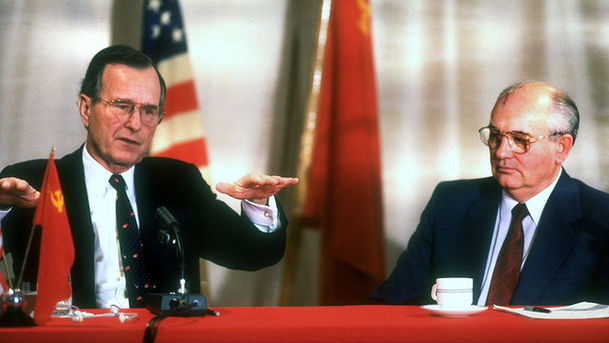
1989: Day by Day - 30th November 1989
Sir John Tusa looks back at the events making the news 20 years ago. Record libel damages are awarded to Conservative peer Lord Aldington after being accused of war crimes.
Details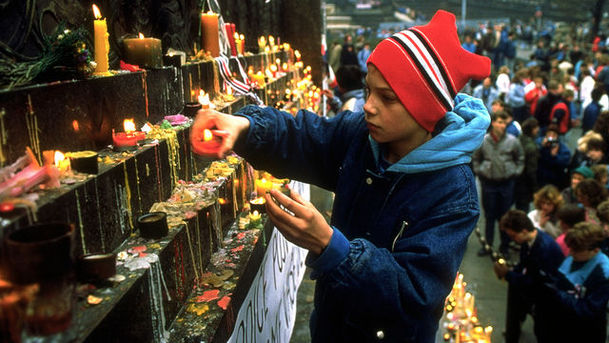
1989: Day by Day - 30th October 1989
Riots in Moscow follow a demonstration outside the KGB headquarters; the Bishop of London warns the Church against an invasion of female priests.
Details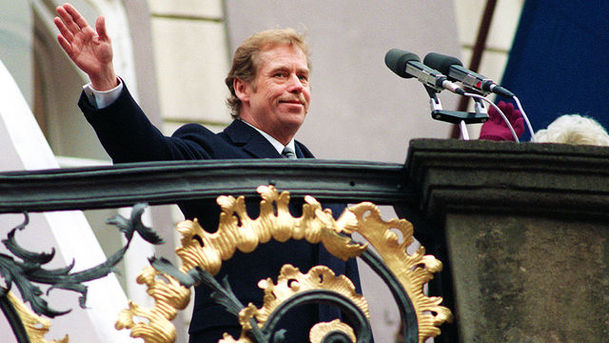
1989: Day by Day - 31st December 1989
Sir John Tusa looks back at the events making the news 20 years ago. A new Europe sees in a new year.
Details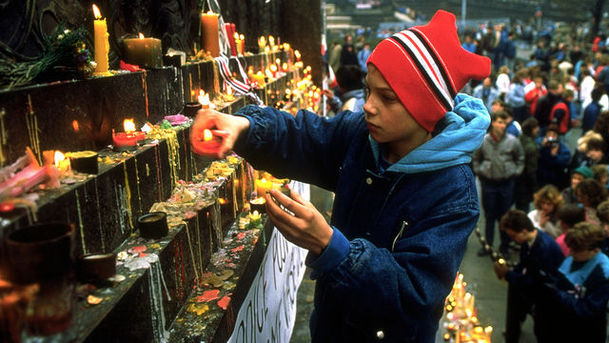
1989: Day by Day - 31st October 1989
Former Chancellor Nigel Lawson tells the House of Commons why he resigned; shadow energy secretary Tony Blair demands electricity privatisation plans be scrapped.
Details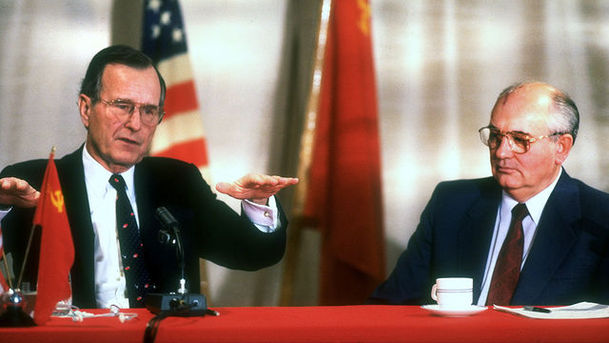
1989: Day by Day - 3rd December 1989
George Bush and Mikhail Gorbachev declare that the Cold War is over, as hundreds of thousands of people form a human chain to demand reforms in East Germany.
Details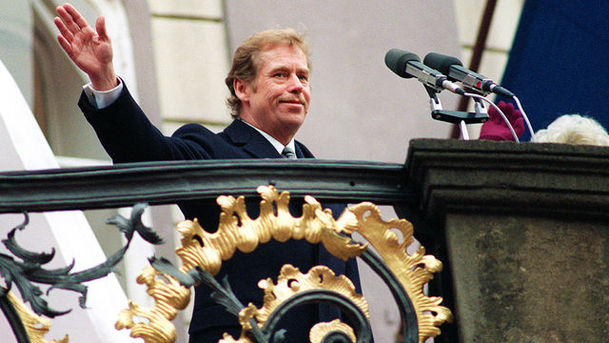
1989: Day by Day - 3rd January 1990
Sir John Tusa looks back at the events making the news 20 years ago. In Panama, General Noriega gives himself up to US forces.
Details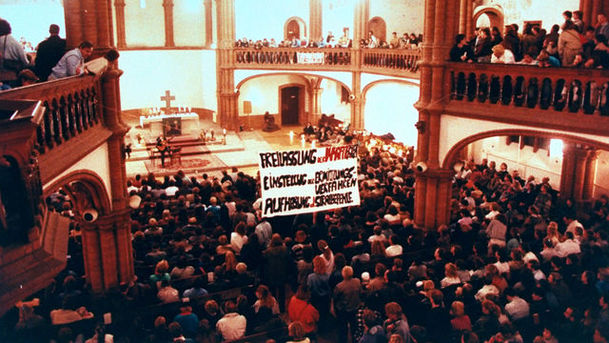
1989: Day by Day - 3rd November 1989
Protests in East Germany force the resignation of the Mayor of Leipzig and five government hardliners; trouble for Gorbachev as Russian miners down tools.
Details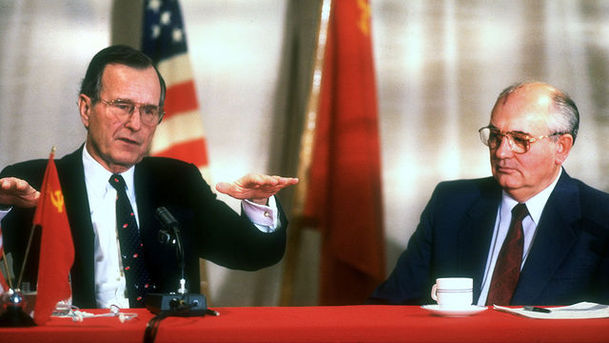
1989: Day by Day - 4th December 1989
For the first time, the Soviet government joins other Warsaw Pact countries in condemning its own invasion of Czechoslovakia in 1968.
Details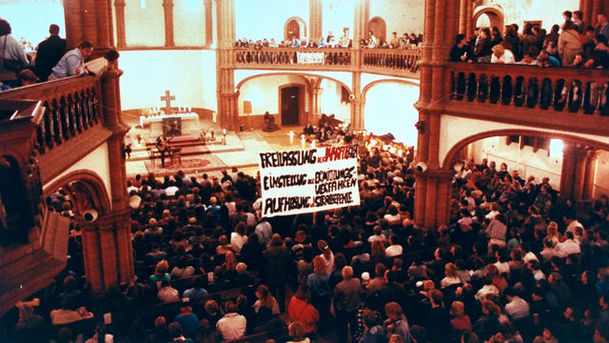
1989: Day by Day - 4th November 1989
Margaret Thatcher is the least popular prime minister since polling began - she will stand down after the next election; SDLP leader John Hume throws down the gauntlet to the IRA.
Details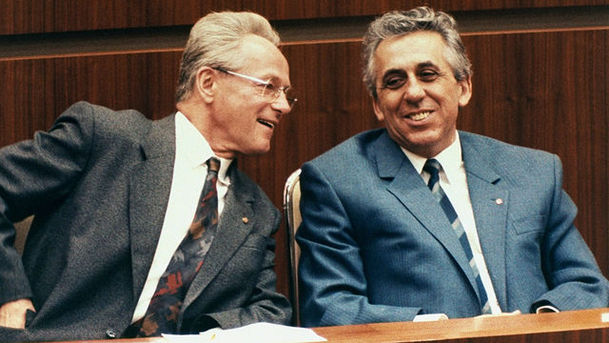
1989: Day by Day - 5th December 1989
Sir John Tusa looks back at the events making the news 20 years ago. Mrs Thatcher faces her first leadership challenge.
Details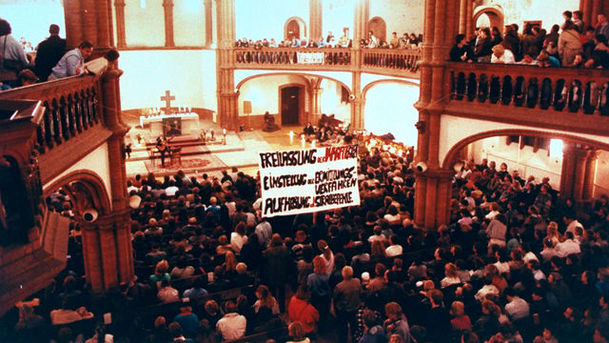
1989: Day by Day - 5th November 1989
Former Chancellor Nigel Lawson makes things even more difficult for Margaret Thatcher by spilling the beans on TV; the Sony Walkman celebrates its 10th birthday.
Details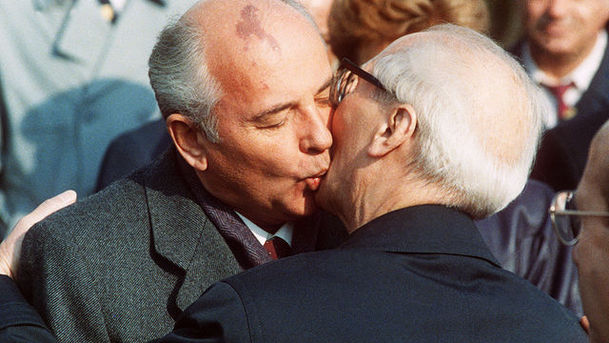
1989: Day by Day - 5th October 1989
A chilling warning is delivered to East Germany's opposition groups: 'remember Tiananmen'; thousands of jubilant East Germans arrive in West Germany on the so-called Freedom Trains.
Details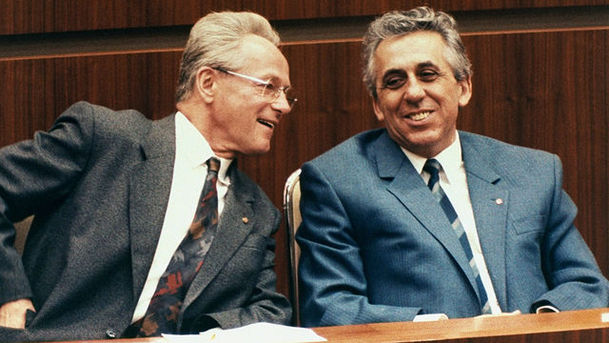
1989: Day by Day - 6th December 1989
Sir John Tusa looks back at the events making the news 20 years ago. East Germany's leader Egon Krenz resigns.
Details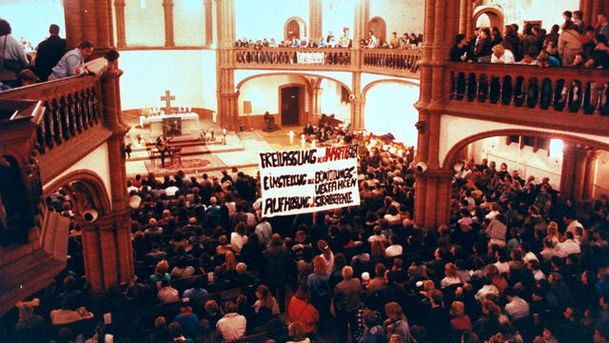
1989: Day by Day - 6th November 1989
A backlash against East German refugees begins in West Germany; supporters of women's ordination hold an overnight vigil outside Lambeth Palace.
Details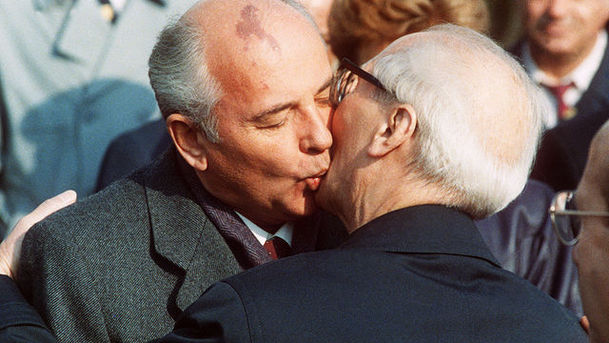
1989: Day by Day - 6th October 1989
Gorbachev begins a historical visit to East Germany to help celebrate the GDR's 40th anniversary; East German leader Eric Honecker continues to take a hard line.
Details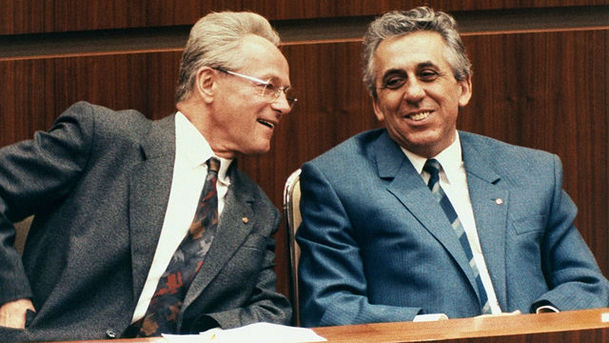
1989: Day by Day - 7th December 1989
Sir John Tusa looks back at the events making the news 20 years ago. The Czech prime minister Ladislav Adamec resigns.
Details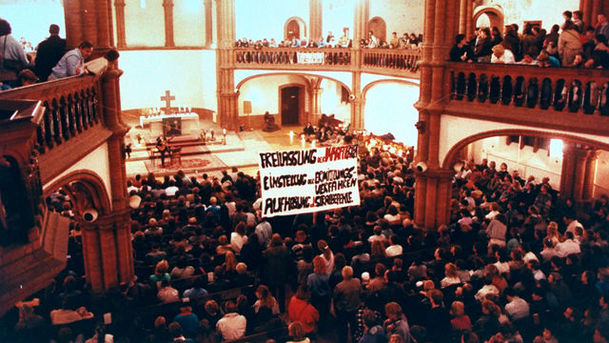
1989: Day by Day - 7th November 1989
The communist authorities in the GDR are buckling under the pounding they are taking in the streets; 8,000 troops celebrate 72 years of the Bolshevik Revolution in Red Square.
Details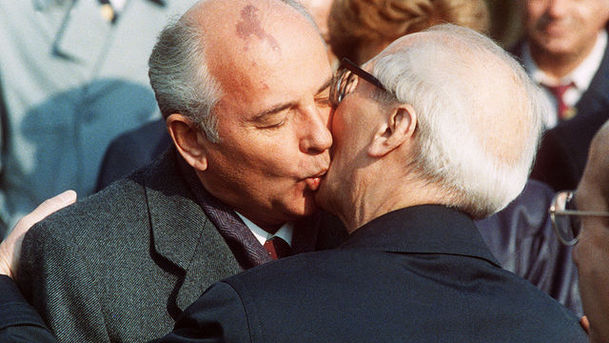
1989: Day by Day - 7th October 1989
Protestors marching through East Berlin to the Church of the Gethsemane clash with police; Hungarian communists vote to become a democracy but some hardliners don't get it.
Details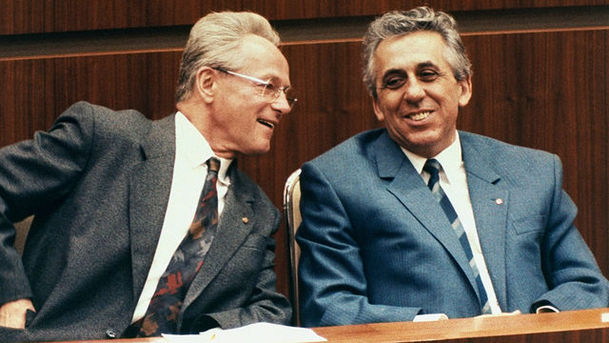
1989: Day by Day - 8th December 1989
Sir John Tusa looks back at the events making the news 20 years ago. East Germany elects a new leader amid fears that the country is descending into lawlessness.
Details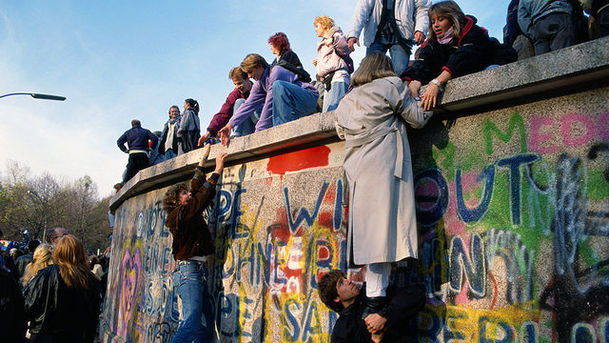
1989: Day by Day - 8th November 1989
The Politburo resigns in East Germany - could the Berlin Wall fall next? The ambulance workers' dispute escalates as the government calls in the army to answer emergency calls.
Details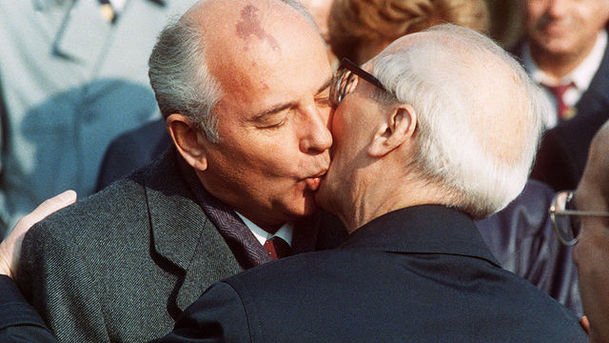
1989: Day by Day - 8th October 1989
Eyewitnesses in East Berlin describe a police crackdown on protestors; one of West Germany's elder statesman sees the beginning of 'the most critical week in the GDR'.
Details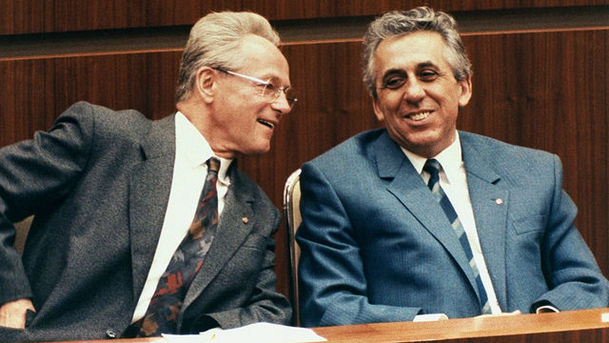
1989: Day by Day - 9th December 1989
Sir John Tusa looks back at the events making the news 20 years ago. Mikhail Gorbachev warns that the Communist Party faces the threat of extinction.
Details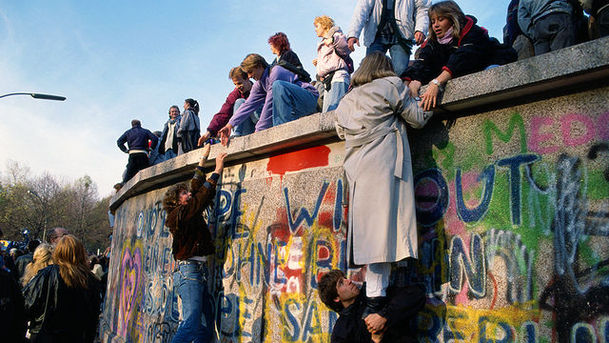
1989: Day by Day - 9th November 1989
East Berlin's party chief says that all citizens can leave immediately - the first border crossings take place at 9pm. Reporter Graham Leach joins the first East Germans to cross.
Details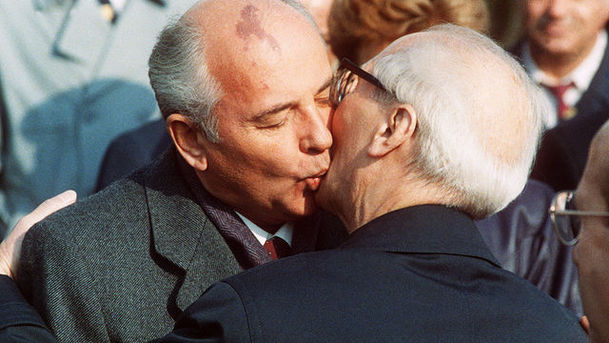
1989: Day by Day - 9th October 1989
At Leipzig's Monday prayer service for freedom, protests approach a historical and perhaps dangerous moment - the East German people now appear to refuse to be intimidated.
Details